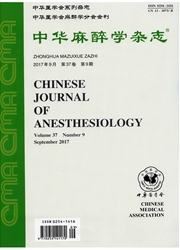

 中文摘要:
中文摘要:
目的:探讨腹腔内热灌注化疗因素对肿瘤细胞减灭术患者术后谵妄的影响。方法择期全麻下行肿瘤细胞减灭术患者120例,年龄18~64岁,性别不限,ASA分级Ⅰ-Ⅲ级,体重40~70 kg。根据是否采用腹腔内热灌注化疗将患者分为3组( n=40):肿瘤细胞减灭术组( CS组)、腹腔内热灌注化疗1 h组( IPHC1组)和腹腔内热灌注化疗2 h组( IPHC2组)。 IPHC1组和IPHC2组肿瘤细胞减灭术后,用化疗药物分别灌注1和2 h。分别于术后1~3 d时采用ICU意识模糊评估法评估术后谵妄的发生情况。结果 CS 组术后谵妄发生率为15%, IPHC1组术后谵妄发生率为28%, IPHC2组术后谵妄发生率为38%。与 CS组比较,IPHC1组和 IPHC2组术后谵妄发生率升高( P<0.05);与IPHC1组比较,IPHC2组术后谵妄发生率升高( P<0.05)。结论腹腔内热灌注化疗可增加肿瘤细胞减灭术患者术后谵妄的发生。
 英文摘要:
英文摘要:
Objective To evaluate the effect of intraperitoneal hyperthermic chemotherapy ( IPHC) on postoperative delirium in the patients undergoing cytoreductive surgery ( CS) . Methods One hundred twenty patients of both sexes, aged 18-64 yr, weighing 40-70 kg, of ASA physical status Ⅰ-Ⅲ, scheduled for elective CS under general anesthesia, were enrolled in the study. According to whether or not the patients underwent IPHC, they were divided into 3 groups ( n=40 each): CS group, IPHC 1 h group (group IPHC1) and IPHC 2 h group (group IPHC2). IPHC1 and IPHC2 groups were perfused with chemotherapeutics for 1 and 2 h, respectively, after CS. Postoperative delirium was evaluated using the Confusion Assessment Method for the Intensive Care Unit at 1-3 days after surgery. Results The incidence of postoperative delirium was 15%, 28% and 38% in CS, IPHC1 and IPHC2 groups, respectively. The incidence of postoperative delirium was significantly higher in IPHC1 and IPHC2 groups than in group CS, and in group IPHC2 than in group IPHC1. Conclusion IPHC may increase the development of postoperative delirium in the patients undergoing CS.
 同期刊论文项目
同期刊论文项目
 同项目期刊论文
同项目期刊论文
 期刊信息
期刊信息
